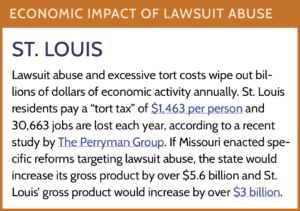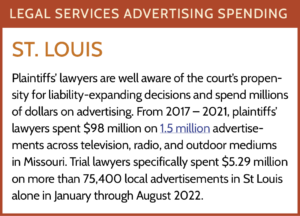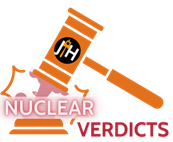JUDGES REFUSE TO EXERCISE ROLE AS GATEKEEPER OVER EXPERT TESTIMONY
Roundup® Litigation
St. Louis, along with fellow Judicial Hellhole® California, is home to tens of thousands of lawsuits against Monsanto involving its Roundup® weedkiller. These lawsuits allege that the active ingredient in the product, glyphosate, causes non-Hodgkin lymphoma.
Despite the Missouri legislature requiring closer scrutiny of proposed expert testimony in 2017 by adopting a standard consistent with federal courts and most other state courts, St. Louis judges have allowed junk science in their courtrooms. Law firms across the country are flocking to St. Louis to file their lawsuits.
In August 2022, the first St. Louis County case involving three plaintiffs from Florida, Washington, and upstate New York went to trial. Ten of the 12 jurors in the St. Louis courtroom sided with Monsanto, even after hearing a month’s worth of unfounded science put forth by plaintiffs’ witnesses. Jurors on the opposite side of the state, in Jackson County (Kansas City), reached the same conclusion in a similar trial just three months earlier.
The St. Louis case fell apart under cross-examination as the expert witnesses proved less than credible. While this jury bailed out the system, it is unreasonable to expect juries to reach the proper resolution in the absence of a judge performing his or her responsibilities.
The LinkedIn resume of one plaintiffs’ witness, William Sawyer, advertised that he was a “board- certified toxicologist” — until he was confronted on the stand and forced to admit that he was unable to obtain certification from the American Board of Toxicology. Sawyer failed both of his attempts to pass the examination required to secure that important credential. Sawyer then turned to Robert O’Block, founder of the American College of Forensic Examiners, who supplied an appropriate diploma. In fact, O’Block was so willing to certify any paying customer that he once certified a cat as a toxicologist.
Sawyer is a full-time expert witness in glyphosate product liability trials, an occupation that has made him a millionaire. Billing $785 an hour for his time, Sawyer has collected $2.5 million from his testimony in four Roundup® trials, according to his own testimony at trial.
At least Sawyer had academic training in toxicology. Fellow expert witness Charles Benbrook, by con- trast, testified about the health effects of glyphosate despite having no training whatsoever in medicine, toxicology, or epidemiology.
Benbrook runs the Heartland Health Research Alliance (HHRA) which produces studies linking cancer to herbicides like Roundup®, as well as competing herbicides like dicamba and 2,4-D. His studies are likely laying the groundwork for future lawsuits against those products.
The trial bar sees great value in Benbrook’s endeavor, rewarding him $1.3 million for his testimony in addition to the $220,000 annual salary he takes from his non-profit, scientific research organization. The trial bar not only provides funding, it provides management direction. The vice chair of that organization is Robin Greenwald, a partner at Weitz & Luxenberg, one of the many firms suing Monsanto.
Environmental safety agencies in the United States, Canada, Brazil, Australia, New Zealand, Japan, and the European Union have spent decades reviewing the health impacts of glyphosate. All agree that no credible evidence exists linking glyphosate to non-Hodgkin’s lymphoma. But there is one outlier organization that says otherwise and it is heavily relied upon by plaintiffs’ lawyers. An advisory group of the International Agency for Research on Cancer (IARC) deemed glyphosate a “probable human carcinogen.” Testimony in 2017 by a senior scientist on that IARC panel revealed critical evidence favorable to glyphosate had been withheld and would likely have changed IARC’s conclusion. The panel was run by Christopher Portier, a scientist who received $160,000 from litigators and worked under the direct supervision of Robin Greenwald.
The jurors bailed out the system this time around, but for St. Louis to move off the Hellholes® list, judges must embrace their role as gatekeepers at the outset of trial and not allow junk science to be heard in their courtrooms.
Pending Litigation
The first Roundup® trial in the City of St. Louis began at the beginning of November. The plaintiff claims that he developed cancer due to prolonged exposure to the herbicide. ATRF will keep a watchful eye on the case to see whether Judge Michael Mullen permits junk science to be introduced in his courtroom.
 While the judges in St. Louis continued to ignore both state law and U.S. Supreme Court precedent and allowed junk science to fill their courtrooms, the Missouri legislature must continue to prioritize reforms to address the lawsuit abuse bogging down business in the state. The future success of the state is contingent on both branches of government addressing the work needed to ensure the state has a fair and balanced civil justice system.
While the judges in St. Louis continued to ignore both state law and U.S. Supreme Court precedent and allowed junk science to fill their courtrooms, the Missouri legislature must continue to prioritize reforms to address the lawsuit abuse bogging down business in the state. The future success of the state is contingent on both branches of government addressing the work needed to ensure the state has a fair and balanced civil justice system.







